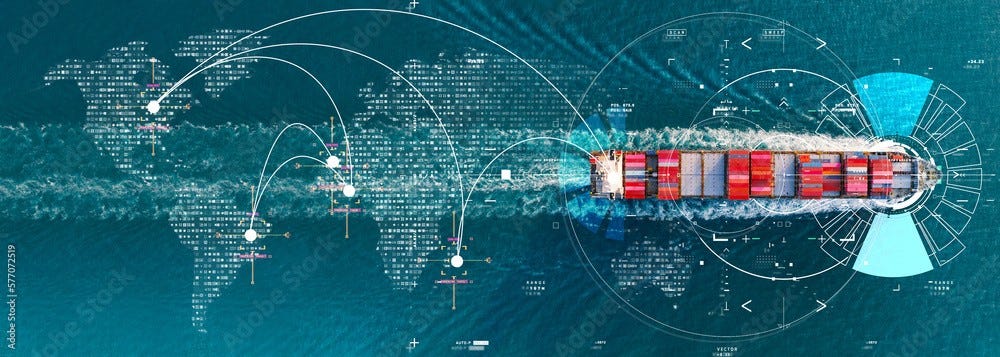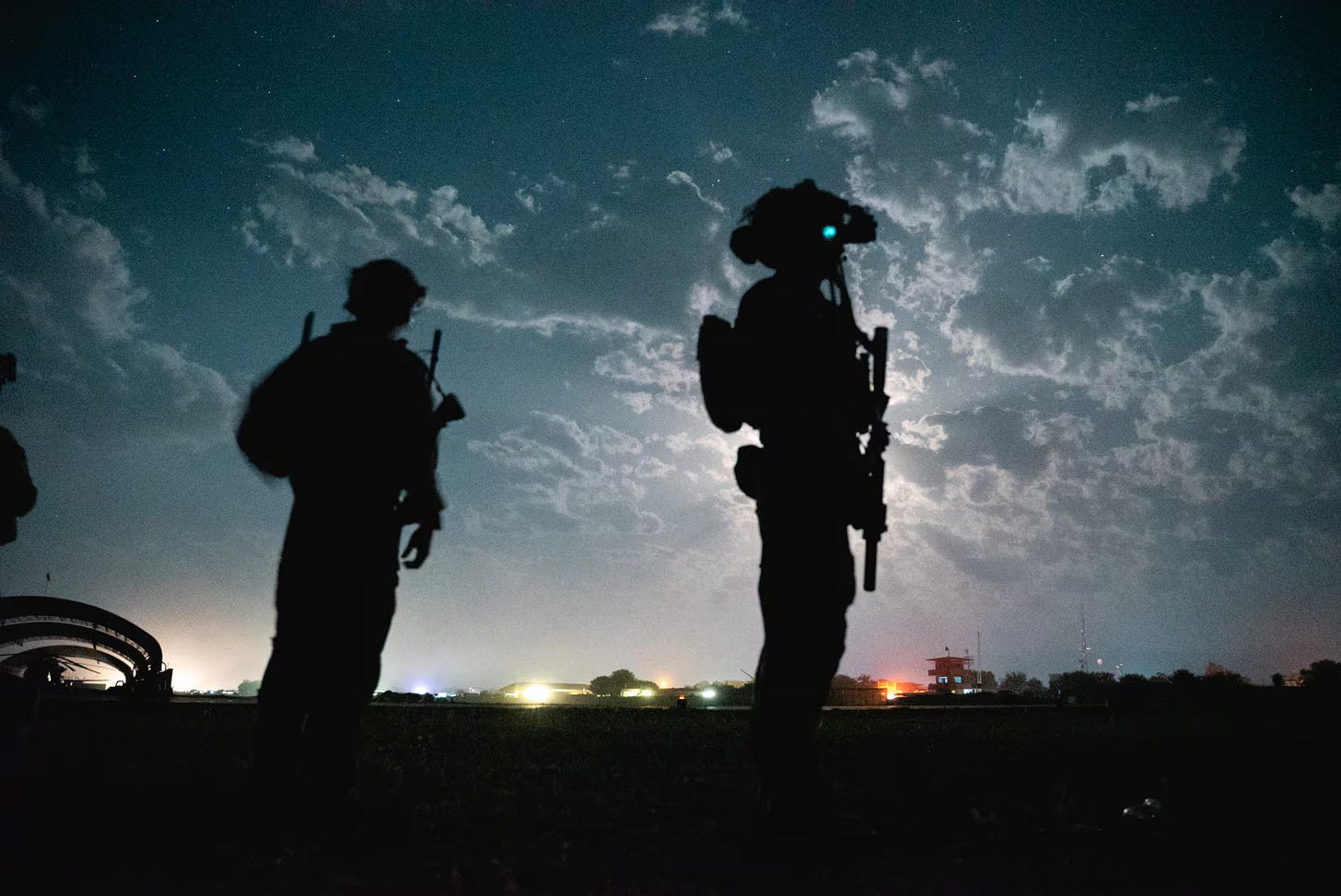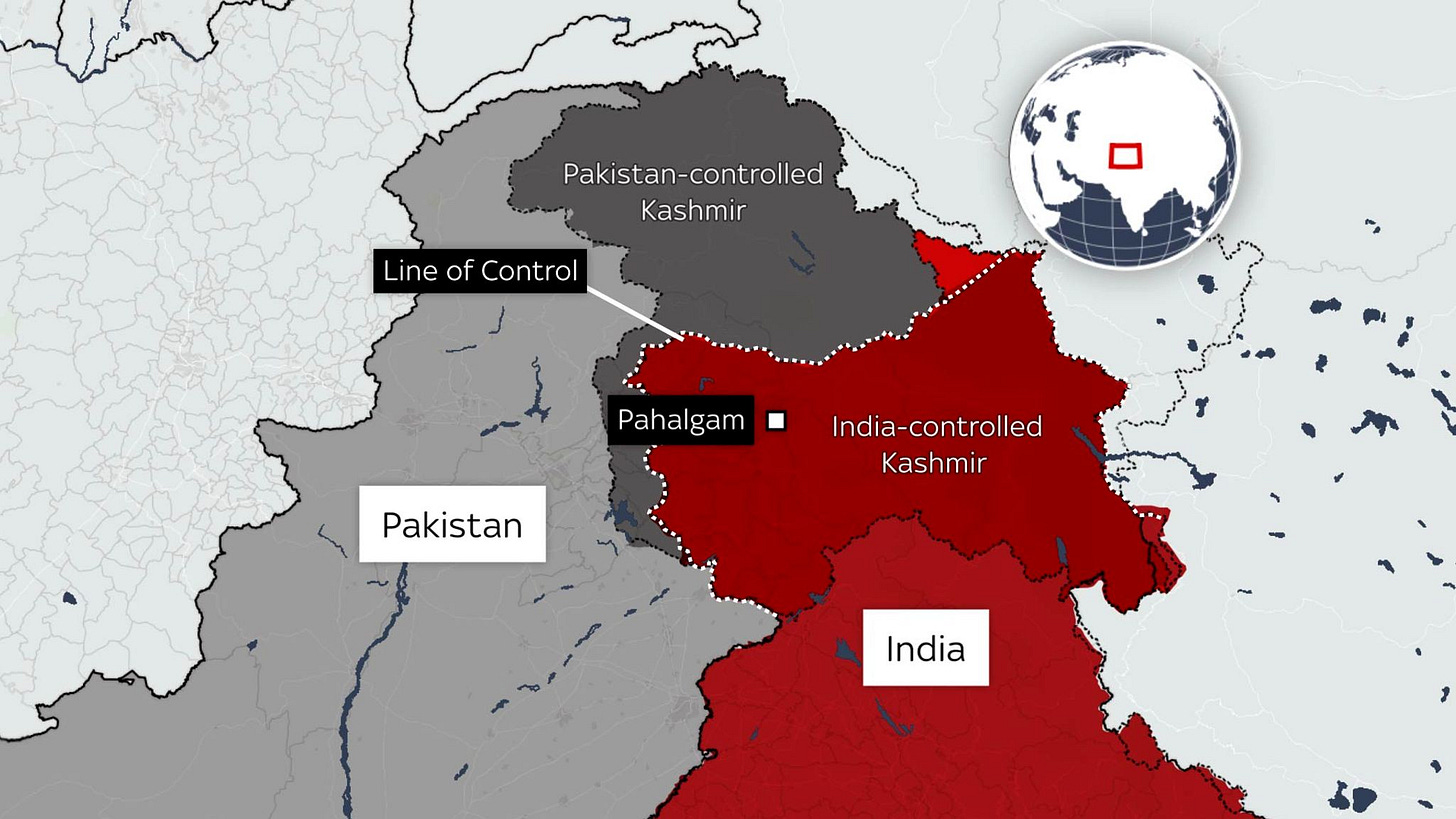I am often able to “maintain my cool”, or, in more eloquent terms, minimize or have no emotional reaction to ongoing events, especially of a geopolitical nature. Thus, I often prefer to wait for the dust to settle and write my analysis on said events and the outcomes they may lead to. Today, I write about ongoing events. Although I maintain no emotional response to the dynamics, they are just significant enough to write about, even promptly. A little callback first, the quote comes from the article.
For the last 18 months, I had a significant one of these. Someone, some group, “something” is trying very hard to replicate the 2020 non-linear dynamics, especially in regards to the global logistical side of it all — different events, different “dynamics” but similar end outcomes. Stretching the system to its maximum capacity.
This should remain at the forefront of your mind or notes for the foreseeable future. The article covers more than one event, but the focus is on a port explosion in China. One single container suffered a catastrophic explosion in one of China’s most important ports, an incident that disrupted the entire global logistical flow for a few weeks. Enough to create cascades in a few industries, fractures that went on mostly ignored.
One event, at one very specific point, was enough to pressure the entire system, but disruption at scale was the name of the game in 2024, given the non-linear dynamics of a fully interconnected, highly dependent system, it is beyond hard to measure the true impact of single events. From a systemic, “bird’s eye” perspective, and with a little time, you get a better picture of the impacts, especially over time.
As the saying goes, the right person, at the wrong place, at the wrong time, can cause massive damage, but the same is easily applicable to events. In the post-pandemic strained world, port disruptions have cascading effects far beyond what most thought was possible. Comes the latest event.
Earlier today, a large explosion occurred in Shahid Rajaee port in the city of Bandar Abbas on the Strait of Hormuz. Shahid is one, if not Iran’s most important port, accounting for over half of Iran’s total trade, and close to 90% of its container traffic, and the explosion already accounts for hundreds of fatalities, located close to Iran’s critical oil infrastructure. The Strait of Hormuz itself is one of the world’s most important logistical choke points and a leverage point for negotiations between Iran and any other country.
Government officials stated no significant damage was done to the oil infrastructure, but trade is completely halted for now. Disruption at this port impacts the world in a noticeable manner, but the impact on global logistics is somewhat limited. Iran’s trade will be disrupted as long as the port remains closed, which is in their best interest to open it up as soon as possible.
But other countries in Central Asia depend on Iran for trade, such as Uzbekistan, Turkmenistan, Kazakhstan, and Azerbaijan, the last 2 for international access, and the first 2 because they are landlocked. Turkmenistan is globally important in the textile, fertilizer, oil, and petroleum products, and natural gas. Uzbekistan is a major cotton producer, gold, copper, fertilizer, and agricultural products (aimed at…Russia).
But among them, Kazakhstan is critically important for many industries. It is the world’s largest uranium producer, accounting for almost 50% of the global supply, one of the world’s top producers of chromium, used in producing stainless steel and other metal alloys, a significant oil producer and exporter, a strong copper producer, and a major wheat exporter.
And if you are asking yourself, yes, disruption at this port directly affects both the Houthis and Hezbollah in a significant manner. It is well known that the port also works as a smuggling and weapons corridor, but there is no easy, diplomatic solution for something so critical, neighboring a global choke point. Diplomacy is a pernicious game after all.
As a last-minute addition, the NYT reports the explosion originated from a container with solid fuel, for usage in missiles originating from... China. Sophisticated sabotage is now highly plausible, if not the real explanation, given that Iran had to replenish its stocks of fuel, chips, and material for munitions. The US government has engaged again in the “nuclear talks” with Iran, thus, the biggest beneficiaries, at a surface level, would be Israel and the United States. On the surface level…
On a good day, this disruption would add some strain to the global logistical flow, given the circumstances we have lived through, the pandemic, lockdowns, pandemic recovery, and the reshuffling of routes because of the long-standing Houthi attack in the Red Sea, plus port disruption at large every 6 to 8 months. The variable that few are accounting for is Trump’s tariff strategy. Regardless of the outcome of the coming negotiations, we are replicating the 2020 shockwaves.
It does not matter if the tariff talks end by early morning on Monday, the current disruption was significant enough to affect almost every industry in China and the US, thus the globe, in a significant manner, the longer it persists, the larger the effects, the deeper the impact. In case this bounds into cryptic territory, the argument is, severe strain is added to our interconnected system, thus being ripe for further disruption, rather than “catastrophe has happened, it is the end of this or that country”.
You can either go back to many of my BMO articles, or simply use Google search and look into many industries and its leaders and the CEOs of leading companies always stating, year over year, 2021, 22, 23 the world had yet to recovery from the pandemic, all systems remained strained as close to the breaking point as they could be, and it would be incredibly difficult to “survive another 2020”.
When the dust settles, deals made and finished, all companies and businesses need to book ships ASAP, containers filled to the brim with material, products, and we go through another maritime snap, when ships wait for weeks to offload at ports. There won’t be enough trucking companies to move cargo because many are going down right now. An explosion here, an accident in a choke point there, and it is 2021 again. Then 2022 again. You get the picture.
Your focus should be on the flow of physical goods. That talks louder than words, policy, or the stock market, because it reflects, purely and simply, the real state of the world.
Below the surface, as a long game that will look contrived or paradoxical from our Western perspective, a likely beneficiary would be China. While short-term it reduces global trade, creates severe economic strain and pain to most countries, higher volatility in maritime logistics, increased costs on both transport and especially insurance, leads to “friend-shoring” moving production closer to other countries in South Asia but at the same time, over a long enough timeframe, let us say for sake of argument, 15 years, it makes China’s Belt and Road Initiative incredibly attractive.
Another few steps towards global war
As I forecasted last year in one of my Fourth Option articles, Ukraine peace wouldn’t come anytime soon, and any real ceasefire and peace deal will only happen by the 4th quarter (October through December) of 2025. A diversion from this outcome means another war is initiated elsewhere, the unspoken deal brokered in the shadows. As such, the war in Ukraine has no sign of stopping, diplomatic gaffes are abundant on all sides, blackmail, bribery, and other sordid actions permeate the grounds.
Regardless of your perspective on Zelensky’s complete lack of innate talent, acumen, diplomatic touch, vision, and strategy, he finds himself between a rock the size of a continent with a powerful military and a hard place, his own paramilitary army elevated now as a powerful influence inside Ukraine with considerable decision-making weight, the Neonazi batallion Azov, propped up Ukranian Intelligence services (SBU) in recent years and by the CIA since 2014.
Merely a few days ago, a senior Russian Officer was assassinated in a car explosion, prompting Russia’s FSB to act fast, and the perpetrator has already been apprehended, named Ignat Kuzi, allegedly a Ukrainian special services agent. This makes sophisticated sabotage highly plausible, with the rather troublesome outcome of “coincidences” occurring on our shores.
A coincidence did occur, but before the assassination of the high-ranking Russian officer. Northrop Grumman’s Promontory complex building suffered a significant explosion on April 16. While kept under strict word to mouth, this specific complex is responsible for the research of hypersonics. If indeed an act of sabotage, it is a rather sophisticated, and a “card” you would only use to send a message to specific groups of people, in a similar vein to the Green Beret that “committed suicide” inside a Tesla at one of Trump’s hotels.
The loud message only made sense when the Russian government made another assassination public, Russia’s leading Electronic engineer, Krasukha Rytikov, was killed by a bomb under his car a few weeks ago. Russia’s EW is either number 1 or 2 in the world, they have been at the lead for decades, at the forefront of disruptive technology, and they are one of the reasons a lot of “American hardware” failed in Ukraine at first, and Rytikov, the mind behind it all.
The Northrop message now made more sense, as Russia has engaged in a hybrid tit-for-tat way regarding the US, whenever Biden chose to aid Ukraine in any substantial manner, a “coincidence” would hit our shores shortly after.
There have been a lot of other significant events, such as the entire Iberian peninsula, Portugal, a part of France, and Belgium experiencing a massive and still-lasting blackout. The alleged backwater Houthis taking 7 Reaper drones out in the last 7 weeks alone, costing roughly 200 million dollars in hardware. And as a matter of track record.
In one of my articles last year, I stated the Houthis were getting targeting data, laundered through Iran from a third-party country, most likely China, as China was using the disruption as a large, substantial data collection and testing operation. The American State Department accused a Chinese satellite company to direct support to the Houthis with targeting data.
And as a wild card in the past few days, India suffered one of its largest terrorist attacks, targeting mostly tourists, on India’s controlled side of Kashmir. With substantial evidence pointing towards an attack coming from Pakistani territory, pushing both countries into a hasty escalation. In no dissimilar fashion to Israel suffering its most tragic terror attack, which instigates a war between Israel and Hamas… spooks do tend to use the same playbook ad nauseum.
From 2020 to 2023, January set the tone for half or most of the coming year, but I suspect a significant shift occurred, and perhaps this year, May, June may set the tone for the next 12 months.
The overarching picture is that someone has been usurping hybrid warfare tactics, which now rely heavily on sophisticated, layered sabotage and diverse forms of covert action to push the limits of global resilience and stretch the system to as close to a breaking point as it can. But this is a topic for another article.
Consider becoming a supporter, and if you do or are, thank you =D !










create enough chaos and you might need extraordinary measures to kwell it. AMIRIGHT?
I wish it was still yesterday, before I read this bleak news. Hey, how about those Canadian Liberals, eh? Got an elected minority government, partnering with Bloc Quebecois to ensure smooth passage of the bill PM Carney is bound to pass to get CDBC and more Chinese-style authoritarian power to control social media, real estate values, public broadcasting, and dissenters like the truckers who made a convoy to Ottawa to protest the killer bioweapon mandates. I smell a mask mandate coming for a trumped-up (ha ha) reason. The NDP leader Jagmeet Singh resigned because the party lost its party status. Elizabeth May is the sole surviving lonesome Green MP, not one single fringe party member or Independent candidate got a seat, and the Conservative leader Pierre Poilievre lost his seat to a Liberal but is vowing to stay on as Conservative leader. Oh well, it doesn't really matter. All we have is (mostly foreign-owned) water, timber, uranium, a bit of rare metals mining, wheat, canola, some potash, vacation properties owned by rich Americans, and no way to defend any of it.